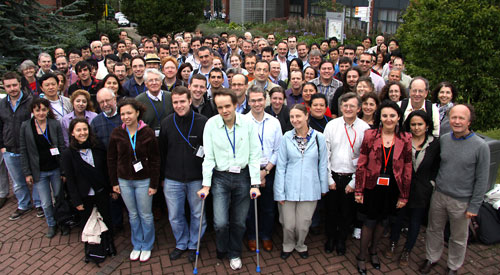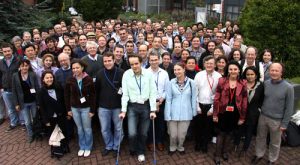
International Astronomical Union Symposium 284
The beginning of autumn 2011 saw UCLan hosting Symposium 284 of the International Astronomical Union (IAU). The event was chaired by Dr Cristina Popescu, from the UCLan’s Jeremiah Horrocks Institute (JHI) for Astrophysics and Supercomputing, School of Computing, Engineering and Physical Sciences, jointly with Dr Richard Tuffs from the Max Planck Institute for Nuclear Physics in Heidelberg, Germany.
The conference took place at UCLan between 5-9 September 2011 and had the title ‘The spectral energy distribution of galaxies (SED2011)’. The IAU Symposium 284 was one of the 10 Symposia held around the world and sponsored each year by the IAU. It was a great privilege for UCLan to have been awarded the Symposium’s IAU grant, and for UCLan’s Jeremiah Horrocks Institute and Preston to have been selected to run this event.
The Symposium was won in the face of fierce international competition.
Professor Gordon Bromage, Director of JHI, commented: “Everything went extremely well, and without exception all the visitors’ comments, verbal and written, were full of praise and appreciation. The conference was an astounding, rewarding success, in bringing together researchers from a number of different sub-disciplines, fulfilling the interdisciplinary aims and world-linking mission objectives of our main sponsors, the International Astronomical Union (IAU).”
Professor Jay Gallagher, from the University of Wisconsin-Madison, USA, and member of the Scientific Organising Committee of the conference said: “This conference had the ambitious goal of bringing together astrophysicists working on all spectral ranges, from gamma-rays to radio wavelengths. There was actually a high risk that the concept would not work, as it is so difficult to bring together specialists working in so many different fields and make them share their views and interact in a constructive way.”
“But the chairs of the conference, Dr Cristina Popescu and Dr Richard Tuffs managed to achieve this goal and the conference was a great success.”
“Everybody was intellectually enhanced. It was not only a forum for the top specialists, but also a major opportunity for the PhD students and young scientists that were brought from all over the world, thanks to the International Astronomical Union grants. I was delighted to hear from the three PhD students from the University of Wisconsin that their participation had given them a new perspective and understanding of how each other\u2019s work fitted together. This is due to this symposium.”
Enthusiastic comments regarding the IAU Symposium 284 came from all the participants to the conference: professors, senior astronomers and physicists and also early-career researchers, from all over the world.
PhD student Noelia Jimenez, from the University of La Plata, Argentina, one of the very young participants to the conference remarked: “This wonderful Symposium has been a very enriching experience in all senses. With this meeting I had the possibility to meet and interact with people studying galaxies, but with very different methods and approaches than ours.”
“We were able to discuss ideas from different points of view. It has been very helpful to talk to some of the people I only knew from their papers, and to interchange ideas and possible future projects.”
“Everybody was intellectually enhanced. It was not only a forum for the top specialists, but also a major opportunity for the PhD students and young scientists.”
“Also, this scientific meeting has made me think in a completely different way, in a very much complex and complete way, about galaxies themselves. At the moment I am finishing my PhD, working in the field of galaxy formation with numerical methods. The interaction at this symposium with colleagues doing observational work, as well as modellers, is crucial for the understanding of all the processes involved in the formation and evolution of galaxies. For the wise vision and enormous work of the organisers that brought to life such a scientific congress, I am in deep debt.”
The Scientific Organising Committee of the conference consisted of 14 leading scientists from United Kingdom, France, Italy, Greece, United States, Australia, South Africa, Russian Federation, China, Japan, Venezuela. The conference was attended by scientists from prestigious institutions like California Institute of Technology, Stanford University, Harvard University, University of Oxford, Imperial College London, University College London, Durham University, University of St. Andrews, Max Planck Institute for Astronomy Heidelberg, Max Planck Institute for Astrophysics Garching, Max Planck Institute for Extra-terrestrial Physics Garching, Los Alamos National Laboratory, Space Telescope Science Institute, European Space Agency, NASA’s Goddard Space Flight Centre and many others from all continents.
Professor Bromage concluded: “I know that the JHI’s and indeed UCLan’s reputation and visibility were greatly enhanced by this event, in many ways: including the smooth, efficient, people-centred organisation of conference matters in general, as well as the quality of the conference venues, IT, catering, the banquet event, but overall by the great scientific impact of the symposium.”
